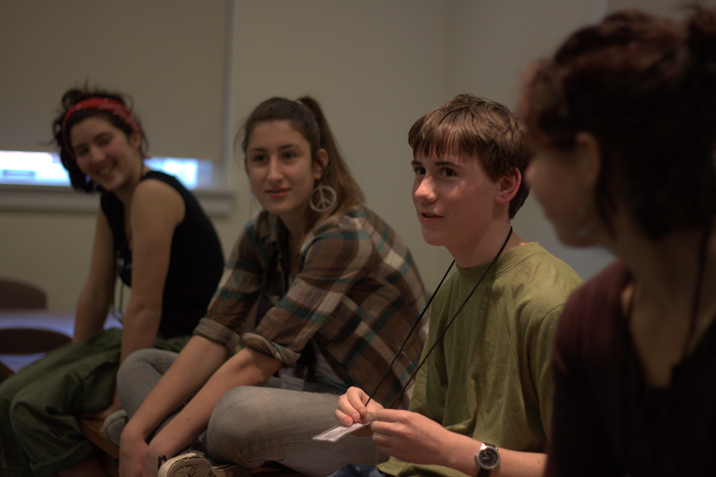

Splash landed on the College’s campus this past Saturday, inviting middle and high school students to a day of unique classes with a curriculum created and taught by undergraduates. The College is among the dozens of institutions across the nation to host the program.
The event was a student-run production, designed and operated by members of the EDU, a campus organization that is part of the national education reform movement. Attendees of the event included home-schooled students, as well as students from charter, public and private schools throughout the Pioneer Valley.
During Splash, students attended classes not typically offered as part of their secondary education. Among the 15 classes were How to Make Money, How to Choose the Next American President, Harry Potter, Mastering Comedic Impressions and How to Make Sushi.
Cal Churchill, a student from Amherst Regional High School, saw Splash as an opportunity to do something interesting with his Saturday. He also encouraged his classmate Sam Meyers to come along. Having taken both of the two film courses offered at his high school, Meyers looked forward to Splash and the experience to take an improvisational film class designed by Nicholas Neisser ’14.
“Middle school and high school students benefit from Splash because not only are they exposed to learning in a college setting, but they also get to experience what they enjoy about arts, humanities and life in an academic environment,” said Crystal Yan ’14.
Splash arrived at the College through the efforts of Yan. While in high school, she took part in Splash at Stanford Univ., but not always as an attendee. Yan taught a microfinance class, and was the only non-student of Stanford to design a course.
She sought to bring a similar academically-oriented community event to the College. With some direction from the Center of Community Engagement, Yan integrated the national program into the College’s community involvement. Daniel Alter ’12, Daniela Fragoso ’13 and Conny Morrison ’12, members of the EDU, were also instrumental in organizing the event.
Created last semester, the EDU attempts to compensate for the lack of an education major at the College, Fragoso explained. With discussions known as Fireside Chats, the organization invites notable individuals in education to speak at the College. Ben Guess ’97, program manager for the Mississippi Teacher Corps (MSTC), has been involved in these discussions, as well as Steve Mancini ’90, the National Communications Director from the Knowledge is Power Program (KIPP).
Yan believes Splash is an important event for the EDU because it folds the principles discussed in Fireside Chats into both a sociological and an academic context.
Before Splash, tutoring existed as the only means to get academically involved with the local community. With the innovative event, opportunities to teach and learn flourished.
“Amherst students get to have their own curriculum and their own class, and they get to teach what they’re passionate about,” Yan said.
The Amherst students involved attended teacher training a week prior to the event.
“I always knew that a teacher should be engaging and enthusiastic, and I assumed that I already was,” said Christian Aviles ’14. “But just having these things reminded to me by the EDU staff was a great motivation.”
Fragoso would like to double the amount of Splash teachers next semester, including more students from the math and science departments.
“To try out teaching, you get to see how hard it is to guide discussion and how much work goes into creating a good learning environment,” Fragoso said. “It’s an awesome opportunity to find out if you enjoy teaching and if you’re good at it.”
Aviles believes the national media unfairly portrays the high school he attended, Roosevelt High School, as a failing institution, calling attention to his class graduation rate.
“There is hope in the individuals that make education happen,” Aviles said. “Certainly we see that students in the U.S. are dropping out at an alarming rate, or that test scores are dropping, or that American students are falling behind. Teachers are what helped students like me get to where we are today, despite adversities or the negative portrayal of the media. And I wanted to be that teacher for an individual.”
Although the event had more than 50 students, Fragoso regretted not starting recruitment earlier, saying that the EDU could have accommodated an additional 40 students at the event.
“I would love to have more students from Holyoke and Springfield who might not have access to something like Splash,” Fragoso said. “We’ll definitely be working to establish more partnerships with schools in the area.”
The EDU plans to host another Splash event next semester.